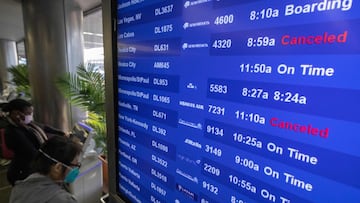Flight cancellations due to weather: What can I do if my flight gets cancelled or delayed?
Flights have been grounded at airports across various parts of the US due to severe weather, causing thousands of flight delays and cancellations.

The threat of severe weather has caused the grounding of flights in various airports across the whole country, leading to thousands of flights being delayed or canceled.
Due to hazardous weather conditions, some airports are asking travelers to check on the status of their flights before coming to the airport and contact their airline if they have any questions.
Delays and cancellations are frustrating for any traveler, but people do have some rights when these unfortunate events take place.
READ ALSO: Texas schools close due to freezing Arctic Blast
Travelers: If your flight is cancelled for any reason—including weather—and you choose not to rebook, you are entitled to a full refund. https://t.co/O6hU51mOku
— U.S. Department of Transportation (@USDOT) January 14, 2024
One-fifth of flights get delayed
Air travel is the second most utilized transportation mode in the United States. It should come as no surprise that the percentage of travelers that take a flight to their destination and home increases the longer the round-trip distance. Commercial planes in the US generally arrive on time, but roughly 20% of flights get delayed and almost 3% canceled.
Between January and December 2022, over three-quarters of flights reached their destination on time according to data from the US Department of Transportation. Of those that didn’t, roughly 20.5% had some form of delay and 2.7% of them were canceled.
So, what recourse do travelers have if their flight gets canceled or delayed this year? Ticket holders’ rights vary depending on whether the flight was canceled or delayed. Here’s what the US Department of Transportation has to say.
READ ALSO: Arctic front hits Texas: Affected areas and temperatures

Airline passenger rights
Flight cancellation
Passengers are entitled to reimbursement of the full cost of the ticket for the part of the journey not made, or re-routing at the earliest opportunity should a flight be canceled by the airline for international travel. If you are already at the airport and you opt for re-routing, you should be also entitled to meals and refreshments in proportion to your waiting time, and two telephone calls, texts or emails. You are also entitled to overnight accommodation if you are to be re-routed the day after your planned flight and, depending on the circumstances, to monetary compensation.
Flight delays of more than three hours
Should a passenger arrive at their final destination with a delay of 3 hours or more, they may be entitled to financial compensation, as long as the delay was not caused by extraordinary circumstances. If your flight is delayed for two hours or more at departure, the airline must offer you care (meals and refreshments and, if necessary, accommodation). If this delay means that you arrive at your final destination with a delay of more than three hours, you may also be entitled to financial compensation.
The small print
Each airline has its own policies about what it will do for delayed passengers and every customer should read the cancellation policy ahead of booking flying as there are no federal requirements in the US. If you are delayed, ask the airline staff if it will pay for meals or a phone call. Some airlines, often those charging very low fares, do not provide any amenities to stranded passengers. Others may not offer amenities if the delay is caused by bad weather or something else beyond the airline’s control. Contrary to popular belief, for domestic itineraries in the US, airlines are not required to compensate passengers whose flights are delayed or canceled.
After a lot of pressure from USDOT, every major US airline has stepped up its commitments to customers. For example: a year ago, none of the ten largest airlines guaranteed meals when they’re responsible for a travel disruption. Now, they all do. pic.twitter.com/C7vLeVNqW0
— Secretary Pete Buttigieg (@SecretaryPete) May 29, 2023
Biden administration looking into new rules on flight cancellations and delays
Related stories
The Biden administration announced in May last year that it is looking into new regulations in the event a flight is delayed or canceled. Basically it would establish new federal rules for all airlines on providing ticket holders with assistance and monetary compensation in the event that a flight were canceled or delayed more than three hours when the carrier is at fault.
However, the specifics are still being worked out at the Department of Transportation. In the meantime, airline passengers can check each airline’s compensation policies at FlightRights.gov.

